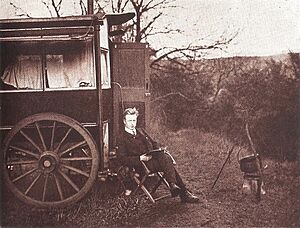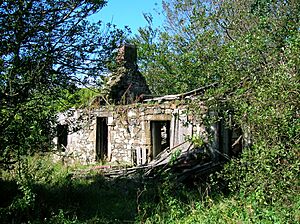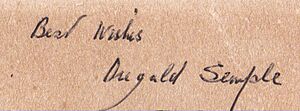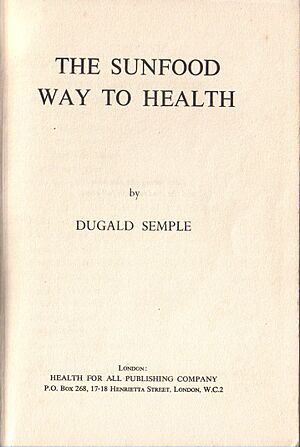Dugald Semple facts for kids
Quick facts for kids
Dugald Semple
|
|
|---|---|
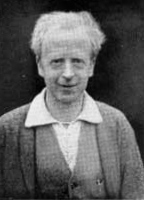
Semple c. 1920
|
|
| Born |
Dugald Patterson McDougall Semple
7 February 1884 Johnstone, Scotland
|
| Died | 19 January 1964 (aged 79) Fairlie, North Ayrshire, Scotland
|
| Resting place | Lochwinnoch Cemetery, Lochwinnoch, Renfrewshire, Scotland |
| Occupation | Advocate, writer |
| Spouse(s) |
Catherine Amos Graham
(m. 1916; died 1941) |
Dugald Patterson McDougall Semple (born February 7, 1884 – died January 19, 1964) was a Scottish writer and nature lover. He believed in living a simple life and caring for animals. He was also a fruitarian, meaning he mostly ate fruits, nuts, and vegetables. Some people say he helped start the vegan movement in 1944.
Contents
About Dugald Semple
Dugald Semple was born in Johnstone, Scotland. His mother was from a farm, and his father was a tailor. Dugald was smart and won a scholarship to a good school. He later trained to be an engineer.
In 1907, he decided to live a very simple life. He moved into a tent, and later an old bus, in Linwood Moss. During World War I, he was a conscientious objector. This meant he refused to join the military because of his beliefs. Instead, he lectured people on how to save food.
Living a Simple Life
Dugald Semple was known as the "Scottish Apostle of the simple life." From the 1930s to about 1950, he farmed at Davie's o'the Mill near Beith. This was a smallholding, a small farm. Dugald was like a "hippie" before the term existed. He was sometimes called the "Hut Man" because he lived in a caravan, or "hut on wheels." He later lived in Fairlie, North Ayrshire.
Dugald believed in taking care of yourself and others. He often appeared on radio shows. He also lived in London for two years. During that time, he worked as the secretary for the Vegetarian Society.
He loved the outdoors and often visited Ailsa Craig, an island known for its birds. People there called him the "Bird Man." He even wrote a book called A Free Man's Philosophy about his outdoor life. He welcomed hikers and cyclists to camp on his land.
Dugald's Diet Journey
In 1963, Dugald shared how his diet changed over the years:
- Around 1910, he stopped eating all meat, milk, eggs, butter, tea, and coffee.
- He then ate mostly nuts, fruits, cereals, and vegetables for about ten years. He felt much healthier and stronger.
- During World War I, he added some dairy products back into his diet.
- When he returned to Scotland, he slowly stopped eating dairy again.
Later in life, Dugald lived in a modern house and even owned a car. He died in a nursing home in Fairlie when he was 79. His wife, Cathie, passed away before him in 1941. They did not have any children together.
His Beliefs on Food
Dugald Semple was a strong believer in Fruitarianism. This diet mainly focuses on fruits and nuts. He wrote an article in 1907 explaining his views. He said that cooked cereals and vegetables could be included. But he thought eating only raw foods was even better.
Dugald believed that milk and eggs were not natural foods for humans. He said, "Eggs were meant to produce chickens and not omelettes." He also felt that cow's milk was perfect for a calf, but not for grown-up people.
In his 1915 book, Joys of the Simple Life, he wrote about his diet. He said he stopped eating meat and drinking tea ten years earlier. For eight years, he rarely used milk, eggs, salt, sugar, or white bread. He felt his health greatly improved.
His Impact and Influence
Dugald Semple was a very active person. He held many important roles in vegetarian and simple living groups.
Leadership Roles
- In 1938, he was the President of the Scottish Vegetarian Society (SVS). He was also Vice-President of the Vegetarian Society.
- In 1944, he was the chairman of the Vegan Society. He was also Vice-President of the International Vegetarian Union.
- In 1953, he became the Honorary President of the Scottish Vegetarian Society.
Sharing His Ideas
Dugald traveled to many places to share his ideas. He gave lectures in the USA, Canada, and other parts of America. He also arranged lecture tours in Scotland. He would talk about his simple way of life and healthy eating.
Conferences and Speeches
Dugald attended many important vegetarian conferences around the world.
- In 1938, he went to the 10th World Vegetarian Congress in Norway. He spoke about "Vegetarianism and Peace." He believed that war would stop only when people stopped living like "beasts of prey." He felt that harming animals was similar to harming humans.
- In 1953, he attended the 15th World Vegetarian Congress in India. He spoke about protecting animals. He hoped India would continue to value animal rights. He believed that war and illness came from ignoring natural and spiritual laws.
- In 1955, he was a speaker at the World Vegetarian Congress in Paris.
Helping the Government
During World War I, food was scarce. The government asked Dugald and a colleague for help. They advised people on how to ration food. They also suggested healthy substitutes for meat.
No Stipend League
Dugald also started a group called the "No Stipend League" in Scotland. This group was against the Church of Scotland's practice of collecting money from landowners. This money was for the minister's salary. Dugald felt it was unfair because it applied to all landowners, no matter their faith.
Books by Dugald Semple
Dugald Semple wrote many books about his ideas on simple living, health, and diet. Here are some of them:
- Simple Life Visitors. (1909)
- Living in Liberty: Or, The Wheelhouse Philosophy. (1911)
- Fruitarianism: A Treatise on the Diet Question. (1913)
- Joys of the Simple Life. (1915)
- Simple Life Recipes: With Hints on Diet. (1915)
- Life in the Open. (1919)
- Diet and Good health: A Popular Treatise on the Food Question. (1925)
- A Free Man's Philosophy. (1933)
- What to Eat in War-time, with Meatless Recipes by Cathie Semple. (1943)
- Be Your Own Doctor: Natural Cures for Common Ailments. (Around 1945)
- Looking at Nature. (Around 1946)
- A Scots Health Cookery Book, with Meatless Recipes by Cathie Semple. (1949)
- The Sunfood Way to Health. (1956)
- Joy in Living. (1957)
Images for kids


